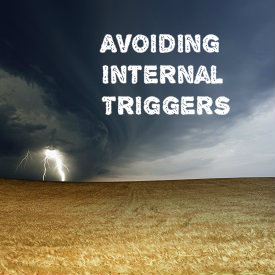The removal of external triggers can be as simple as a change in scenery or new group of friends. Unfortunately, internal triggers – feelings and moods – can also impact the success of rehabilitation. In order to ensure a happy and long-lasting recovery, addicts must identify both external and internal triggers. Discover a few of the more common triggers to help jump-start the process.
Identifying Internal Triggers
A relapse trigger, whether internal or external, is something that sets off cravings in recovering individuals. Failure to address and maintain these triggers during the recovery process only serves to increase the risk of relapse.
An internal trigger is something going on inside our minds or bodies that promotes the urge to relapse. Whereas external triggers are defined as people, places and things; internal triggers generally fall under hunger, anger, loneliness or fatigue.
Mental Health And Addiction
Drugs and alcohol are often used to self-medicate mental illness and mask negative emotions. The correlation between mental health and addiction has been studied extensively, with addiction treatment facilities now offering dual diagnosis programs. When a dual diagnosis is apparent, mental health and addiction specialists must address both the addiction and mental illness in order to ensure a long, healthy and happy recovery.
At Summit Behavioral Health, our specialists work with patients to identify specific internal and external triggers through group and individual therapy. Here, patients are provided the tools and resources needed to combat their addiction while learning tactics with which to utilize moving forward.
Individual Therapy
Once patients have learned to identify their triggers, a plan of action is necessary to help avoid and anticipate the effects. Specialists often recommend “thought stopping” strategies, the development of refusal skills, and the avoidance of high-risk situations. Addition treatment will help patients learn how best to utilize these strategies while forging their own recovery path.
Need Help With Addiction?
If you or someone you love is struggling with substance abuse, Summit Behavioral Health is the place to turn.

